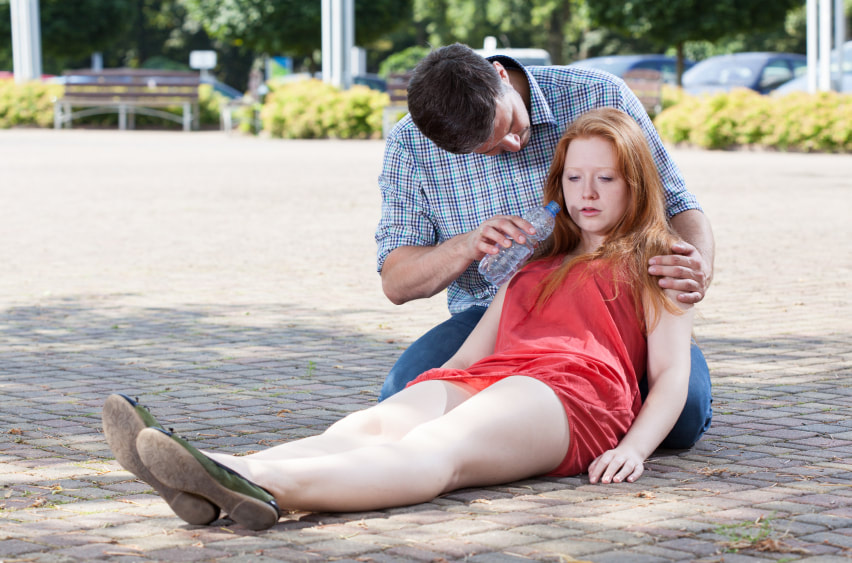 Fainting is Common Under the Age of 35 & Above the Age of 70 Fainting is Common Under the Age of 35 & Above the Age of 70 Its not a rare sight to witness children faint at school while standing under the scorching sun during assembly time, securities guarding shops, apartments and other places day and night are prone to fainting and even any individual can lose consciousness and fall down owing to various reasons. It seems frightening to watch a person fall down unconsciously suddenly but in reality, fainting is not as dangerous as it seems. Almost a third of people have experiences fainting at least once. One minute they seem to be normal but the next moment we see them lying on the floor. Cinemas revive an unconscious person by sprinkling water on the person’s face. How different is fainting from unconsciousness? In real life, what causes fainting and what are the precautionary measures we can take to protect ourselves? Fainting-Far Better than Unconsciousness Seeing a person faint right before you is scary as it seems as though the person has died but this is only a phenomenon that happens for a temporary period due to inadequate blood flow to the brain. This inadequacy in blood flow might be owing to reasons such as stress, grief, overheating, dehydration, exhaustion, illness, side effect of certain medications and inactivity. Stay active and refrain from a couch-potato lifestyle to avoid the risk of resulting health conditions, list of which is given at www.firsteatright.com. Its common for prolonged standing in hot conditions to induce fainting but how does inactivity trigger fainting-by restricting blood to pool up in the lower parts of the body thereby diminishing the amount of blood flowing into the brain. A person who faints can be brought back to normalcy in a couple of minutes but its not the same with unconsciousness as the individual does not respond so quickly and can even face greater dangers due this. Common Risks that Induce Fainting Vasovagal syncope or common faint is one due to excessive stimulation of the vagus nerve-a part of the nervous system regulating blood pressure and heart rate. Blood vessels in the legs relax and heart rate slows making it difficult for the blood to get back to the heart. This causes a decline in blood pressure and in turn, drops you to the floor. This type of fainting is very common in people aged below 35 years as a response to negative news, blood, panic, claustrophobia, long coughing spells, strained bowel movements or standing for a long time. The vasovagal syncope attacks younger people because as an individual grows old the nervous system doesn’t react as quickly as before and hence, the frequency of fainting too decreases. Low BP Can Heighten Risk of Fainting On the other extreme is a 70+ person who faints right after getting out of bed in the morning due to sickness. A person fails to eat or drink normally which causes haphazard blood pressure numbers further aggravated by a person’s age, medical conditions and diseases. The elderly population suffer from stiffened blood vessels and the body’s ability to detect BP changes also diminish. Adding to this, these people might take beta blockers (reduce heart rate) and alpha blockers (reduce blood pressure), are more susceptible to dehydration as water consumption decreases and the chances of diseases such as diabetes and Parkinson’s increase all of which enhance the risk of orthostatic hypotension. Irregular Heart Rate If the heart rate is extremely fast there is a drop in BP levels which in turn causes fainting. Likewise, the converse-a very slow heart rate-also causes fainting. Heart attack or any other condition that disrupts normal heart functioning, thyroid problems and certain medications can lead to abnormally slow or fast heart rate. Symptoms While the action of fainting is sudden some people experience any of the following before the fall:
If you are familiar with fainting and you feel like it, lie down with your head low and your legs raised to accommodate blood flow to the brain. If lying down is not possible sit with your head between your knees. Fainting is not dangerous when the person recovers in a matter of minutes. But when there is loss of consciousness for more than a couple of minutes it can be indicative of a serious medical condition such as heart attack, head concussions, diabetic coma, epilepsy or other conditions. If you suspect heat as the cause for fainting, the first step is to move the person to a cooler place, elevate the legs, wipe the forehead with a wet cloth, loosen clothes around neck and waist and if the person is awake, it is advisable to give a glass of water or energy drink to consume. If there is suspicion of carbon monoxide poisoning it is advisable to check if there is normal breathing happening without any disruption. If not, immediately take the victim to a hospital. Don’ts Never slap or throw water on the victim, give him/her something to drink when unconscious except for diabetic patients who might have fainted due to low sugar levels, never move the person unless needed or leave the unconscious person unattended. Fainting isn’t always dangerous, but it is recommended to meet a GP when:
Comments are closed.
|
AVOID FRAUD. EAT SMART.+91 7846 800 800
AuthorDietitian & Nutritionist Dr. Nafeesa Imteyaz. Archives
November 2022
Categories
All
Dr. Nafeesa's Blog @blogspot |
- Home
- Written Testimonials
- Consult
- Clinics
- Blogs
-
Diet & Nutrition
- Diabetes Reversal
- IVF IUI not needed for PCOS PCOD Infertility
-
Medical Nutrition
>
-
Disease & Conditions
>
- Infertility | PCOS
- Diabetes Mellitus
- Cholesterol
- Hypothyroid
- Kidney Problems
- Hypertension
- Cardiovascular Diseases
- Liver Diseases
- Gastro intestinal disorder
- Cancer
- Metabolic Disorders
- Orthopedic Disorders
- Eating Disorders
- Dietary Recall
- Weight Record Filled By Clients
- Online Payment Transaction Details
- Online Clients Weight Check Form
- Our Program Package Service Charges
- Weight Record 2017 Clients
- Measurements sent by Clients
- Terms & Conditions Of Payment
- Thanks. Your Form is Submitted
- Video Testimonials
- Lifestyle & Wellness
- Lifestyle & Wellness Blog
- Allergy & Intolerance
- Weight Loss / Gain
- Weight Loss / Slimming Blog
-
Disease & Conditions
>
- Life Cycle Nutrition >
- Sports Nutrition >
- Integrity in Nutrition
- Knowledge Centre
© COPYRIGHT 2022. ALL RIGHTS RESERVED. FRST HEALTHCARE PVT LTD.
Dr. Nafeesa Imteyaz of First Eat Right clinic, is the Best Dietitian Nutritionist in Bangalore. Best Dietitian Nutritionist in Pune. Best Dietitian Nutritionist in Hyderabad. Best Dietitian Nutritionist in Chennai. Best Dietitian Nutritionist in Mumbai. Best Dietitian Nutritionist in Delhi. Best Dietitian Nutritionist in Kolkata.


